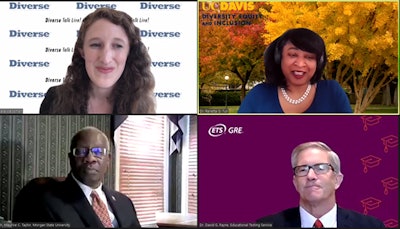Highlighting key strategies that support and prioritize diversity and inclusion in recruitment, admissions and retention amid remote instruction was the focus of a panel titled “Ensuring Equitable Access and Inclusion During a Pandemic.” The event held on Thursday, was sponsored by Diverse: Issues In Higher Education and the Educational Testing Service (ETS).
The panel, which was moderated by Diverse staff writer Sara Weissman, included Dr. Renetta Garrison Tull, vice chancellor for diversity, equity, and inclusion at the University of California Davis (UC Davis); Dr. David G. Payne, vice president for global higher education at ETS; and Dr. Maurice C. Taylor, vice president for academic outreach and engagement at Morgan State University (MSU).
Because of COVID-19, Tull said networking and conferencing have changed higher education tremendously, forcing administrators and faculty “to think about how we can be more inclusive in these video spaces,” she said. “And that may be something we need to consider for the long-term because I think these video conferences — and some of these ways of connecting and corresponding — are here to stay.”
To that point, routine meetings have become “more efficient” and “less expensive” said Taylor, as face-to-face meetings are now hosted through video platforms.
There is a human component to the virtual learning environment, too.
“As a result of this pandemic, we all now have a greater sense that we’re all in this together and have more similarities than differences,” said Payne.
From children in the background to the dog barking, Payne noted that everyone is struggling “to balance multiple demands on our time” — and that relatability, he said, is a good thing.
Relatability, however, is not just important for students but for faculty and staff as well, said Tull, who added that they need to feel supported too.
While there are staff and faculty advisory committees and employee resource groups to help them, UC Davis is still working on ways to expand support, added Tull.
“In the same way that students have become vulnerable in opening their homes virtually, the faculty has decided to do the same thing” to remain accessible to their students, she said.
She added that one of the faculty members at UC Davis, for example, even simulates a classroom-style whiteboard by putting paper on her wall to take notes while teaching virtually.
Still, the COVID-19 pandemic has further exposed the deep inequities that already existed regarding accessibility to education for faculty, staff, students and their families.
“For Morgan, and for Black and Brown students, the inequities that we see with respect to the COVID-19 pandemic are not new inequities,” said Taylor. “They are merely an extension and perhaps an exacerbation of the historic inequities that colleges and universities like Morgan was founded to address,” including the housing crisis.
To support vulnerable students in extenuating circumstances — overcrowding, lack of access to Wi-Fi, poor housing conditions — while simultaneously curbing the spread of the virus, Taylor explained that Morgan offered on-campus housing to 316 students. In this way, they wouldn’t expose their disproportionally vulnerable families to the virus but could still have full access to their education.
The panel noted that during COVID-19, outreach is especially critical to keeping up with current and prospective students.
ETS conducted interviews with 17 institutions to unearth best practices for recruitment amid COVID-19. Throughout the interviews, a common strategy emerged, included transitioning 1-1 meetings online and integrating a personal touch — something all the panelists agreed on.
Developing a holistic admissions approach that goes beyond test scores is important for graduate programs that are serious about recruitment, said Payne.
But “unless you can pay for it yourself, or have someone else to pay for it, then access will always be an issue,” countered Taylor. “And it’s the same for undergraduate or graduate programs.”
At Morgan State, a COVID-19 advisory group has been developed.
“It’s important students note that not only someone [like the college president] cares about their educational growth and advancement but also about their mental health,” he said.



















